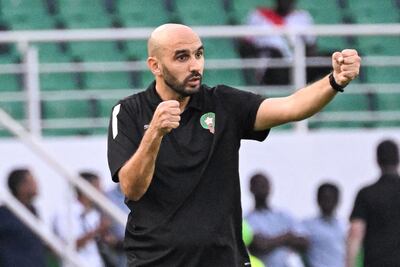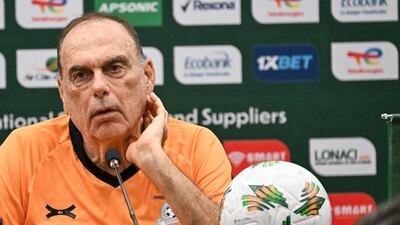On the touchline for the last night of a thrilling Africa Cup of Nations group phase will stand two coaching pioneers of the Mena region.
To one, the garlands keep being offered. Walid Regragui, head coach of Morocco, is the pathfinder for African and Arab football, a rising star whose horizons keep extending. He’s been African club champion, with Wydad of Casablanca, and World Cup semi-finalist within the last 18 months.
If momentum and pedigree are still to be trusted at an Africa Cup of Nations where hierarchy is under constant upstart challenge, the main continental title should be achievable before mid-February.
Up against Regragui on Wednesday is the worldliest coach at this Afcon, Avram Grant. He was a Nations Cup finalist in 2015, a Uefa Champions League finalist in 2008 and is now in charge of a Zambia confronting significant hurdles to make the knockout phase.
They have two points from two games so far and face what Grant calls “the best team in Africa and a fantastic young coach.”
Grant, 68, smiles at the comparison between himself and Regragui, 20 years his junior. But there are clear echoes in their career journeys. In his mid 40s, Grant was suddenly making his name internationally as manager of his country.
That is Israel, usually no more than light-middleweights in the Uefa zone they have competed in since regional conflicts removed them from the Asian Football Confederation generations ago, but on his watch, they came tantalising close to making a World Cup finals.
The storied career that followed – at Chelsea, who he took to a Champions League final, lost on penalties; two further jobs in the English Premier League and stints in Serbia, Asia and Africa – has been nothing if not intrepid.
It has its significant, recurring anchors in Africa and the Middle East where in the last five years Grant, who grew up an Arabic speaker, has represented Fifa across various bridge-building projects.
“Sport reaches beyond politics,” he tells The National when we meet at Zambia’s Afcon base in San Pedro, Ivory Coast. It’s a principle that has defined his career.
At a time of war, he reaches for it more often. Amid the current lobbying for sporting boycotts against Israeli teams, he hears the odd, isolated call for sanctions against individual Israeli sports people too, though none voiced at any volume through his journey to this Afcon.

Zambia’s preparation schedule took them to UAE – for a friendly against Egypt – to a training camp in Saudi Arabia and in Grant’s case, down an avenue of vivid recollections.
He casts his mind back to attending Afcon two decades ago, in Tunisia, and his shock at learning that, in Israel excitable headlines had appeared in the press about his being there all, a high-profile Israeli in a country with whom political relations were hostile: “I fielded calls from everywhere,” he remembers.
He ignored them, and enjoyed a tournament in which Morocco and the hosts contested the final and Morocco’s busy full-back, Walid Regragui, finished with a silver medal.
Grant knew of Regragui the player because he was a club colleague, at Spain’s Racing Santander, of Israeli internationals Dudu Aouate and Yossi Benayoun.
Of Regragui the coach, given the Morocco job less than three months before the Qatar World Cup, Grant beams: “Clearly he has a very good future, and an excellent present. And this is Morocco, a country with an excellent past. But I think the current Morocco team looks the best they have ever had.
“I watched them a lot at the World Cup and could see how well coached they were. They have a great balance and they had a plan well suited to the players. They are a nice team to watch, with very few weaknesses, from the fantastic goalkeeper, Bono, all the way through.”
He admits, candidly, that Zambia against the continent’s number one-ranked team, top of Group F and already guaranteed a place in Afcon’s last 16, looks an uneven contest. “On paper they are the better team, and they have players at the sort of clubs we would like to see more of our players playing for.”
Part of Grant’s challenge in the build-up to Afcon has been coaxing match sharpness from a number of Zambia’s players who are at clubs abroad but lacking playing time this season. Playmaker Kings Kangwa is a case in point.
He’s at Red Star Belgrade, who were in the group phase of the Uefa Champions League. But Kangwa, who scored Zambia’s goal in the 1-1 draw with DR Congo that began their Nations Cup, was involved for just seven minutes of that adventure.
A deeper trust is held in the perpetual sharpness, at least in the opposing penalty area of Patson Daka, the Leicester City striker, whose headed equaliser against Tanzania on Sunday kept Zambia’s hopes alive and, as important for their coach, “showed our character.”
At half time against Tanzania, Zambia trailed 1-0 and were down to 10 men following the greatly disputed sending off, for a second yellow card, of left- back Rodrick Kabwe.
Successive draws leave the onus on Zambia to chase a win on Wednesday. “It’s pressure but I thrive on pressure,” says Grant.
His Afcon back-catalogue has had plenty of it. In 2015, he took Ghana all the way to the final, a modern peak in the context of Ghana’s current status (they have just finished their group here with two points).
They lost to Ivory Coast only after extra time and a marathon shoot-out in which 22 spot-kicks were needed to separate winner from runner-up. “Penalties,” Grant smiles, about that night and Manchester United’s victory, via spot-kicks, over his Chelsea in the 2008 European Cup final, “are not my best friends.”
We are joined in Grant’s suite in the Afcon players village, just outside San Pedro, by a Zambian with happier shoot-out stories to share. He is defender Stoppila Sunzu, 34-year-old veteran warrior in Grant’s team and a Nations Cup winner in 2012, when Zambia defied expectations to win the trophy, beating Ivory Coast on penalties in the final.
Sunzu converted the deciding spot-kick on an emotional night in Libreville, Gabon, not far from the stretch of coast where, in 1993, the plane carrying a talented Zambia team travelling to an away match had malfunctioned, crashing into the Atlantic with no survivors.
“The air disaster is part of what defines Zambia’s football,” says Sunzu, “and so is what a young team then achieved after that, reaching the Afcon final in 1994. Winning the 2012 Afcon was a huge moment.”
He’d like a similar impetus to drive the Zambian generation now emerging. “I look at this team and I see good young talent,” he says. He looks at Wednesday's opposition and he sees the modern model for African aspiration, the continent’s first World Cup semi-finalists.
Then he looks at his likely direct opponent, Morocco striker Youssef En-Nesyri and he sees a formidable set of duels, especially the aerial ones. “Yes, En-Nesyri has a good jump on him,” smiles Sunzu. “But so do I.”


